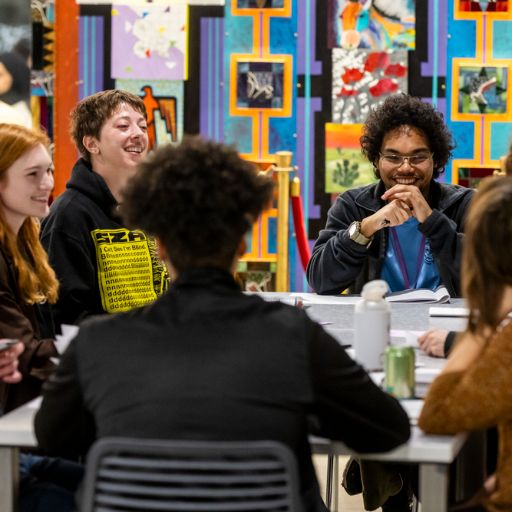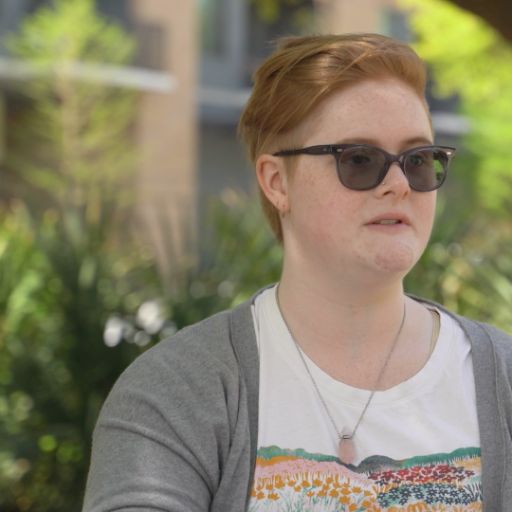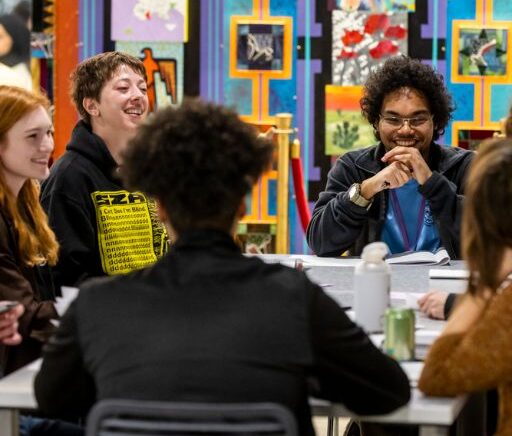What does it mean to be human? This powerful question forms the foundation for ACC’s Great Questions Seminar and is designed to get students thinking – about their lives, their beliefs, their culture, and themselves.
Colleges focus on workforce training or university transfer courses. The seminar offers an opportunity to engage with students on meaningful topics.
In this Article
What is the Great Questions Seminar?
The Great Questions Seminar (known as HUMA 1301 in ACC’s course catalog) is a discussion-based course that urges students to immerse themselves in world culture and philosophy from prehistoric times up to the Renaissance. Classes are small, allowing students to be comfortable in speaking up, sharing opinions, and asking questions. Students engage with classic texts such as Homer’s Odyssey and Plato’s Meno. Assignments include small group discussion, journaling, close reading, and sharing research with the class.
Like EDUC 1300, the seminar fulfills ACC’s Student Success course mandate for first-time-in-college students, but it’s open to all students at the College and satisfies the Language, Arts & Culture requirement in the core curriculum.
ACC has a number of classes that are part of the Great Questions Journey, which is a series of discussion-based classes across all fields that meet core curriculum course requirements, including math, government, communications studies, and more. In these classes, students encounter transformative texts and ideas, forming communities of inquiry where everyone’s voice matters in a collaborative search for truth.
These classes are designed to encourage students to open up and embrace learning new things outside their comfort zone.

Additionally, twice each semester, and occasionally over the summer, the ACC Liberal Arts area of study opens up the Great Questions Seminar to the community. In these Community Seminars, participants discuss transformative texts in small groups, together raising the age-old question: what does it mean to be human?
The Impact of the Great Questions Seminar
This student experience doesn’t begin and end in the course or in the Great Questions Journey courses. Students are meant to carry the lessons they learn in the seminar into their other classes and most importantly, their lives. For the most part, students agree that what they’ve learned made a profound difference in their education and their lives. They speak of the benefits it brings to their other classes and ultimately in their post-ACC education or jobs.
- They are more confident in speaking up in class.
- They have learned how to approach problem-solving.
- They understand why it’s important to dig deep and look beneath the surface of an issue.
- They have gained more self-understanding.
They persevere when times get tough. According to ACC’s Office of Institutional Research and Analytics (OIRA), Great Questions students persist in their studies at greater rates compared to their peers who don’t take the class. Most notably, 44% of first-time-in-college GQS students who successfully complete the course transfer to a four-year university or college after two years of completing GQS. This is a much higher transfer rate than their peers.

“[I was] coming from a high school scenario where you do not have power as a student. … and Great Questions completely shifted that paradigm of learning, of intellect, of power in a classroom dynamic.”
–Lynn Eaton, Great Questions, Fall 2019, Associate of Arts 2022, ACC
Great Questions Seminar Assigned Reading
Many students have not had a chance to read classic works in high school or they may not have appreciated the classics when they were younger. The seminar offers a chance to engage or re-engage with these important texts, which are part of world cultural history.
The following are the core texts for the Great Questions Seminar.
Homer’s The Odyssey
After 10 years fighting the Trojan War, Odysseus (or Ulysses) sails home but encounters numerous obstacles. His journey takes another 10 years. It is a testament to the perseverance and faithfulness of the human spirit. While reading this text, we think about what journey we must take to get to where we need to be, and perhaps also what monsters we must confront along the way.
Plato’s Meno
How do we deal with the discomfort that comes from learning something new that we’ve never encountered before? In Plato’s text, we explore the meaning and mystery of what it is to know and to learn.
Euclid’s Elements
Euclid’s proofs open a door to the beauty of mathematical thinking and teach the structure of logical arguments. By studying these proofs, we learn to identify how we know and understand something, and overcome any fear of math we may have.
Poetry, Revelation, Mathematics and Love: The Human Search for Truth
This collection of readings covers religious texts and poetry across human history and culture. Readings come from philosophers from China, the poet Sappho, the Qur’an, the Bible, and 13th century poet Rumi. By reading across cultures we can find shared humanity in others.
Start Your Journey with The Great Questions Seminar
ACC launched its Great Questions program in 2016. Since that time, more than 4,000 students have taken the course and learned powerful lessons in how to learn, how to think for themselves, and how to engage with hard questions that humans have been asking for thousands of years. Explore the Great Questions Seminar and the ACC Liberal Arts area of study and start your journey at ACC.
Tags: great questions seminar
Back to Top

